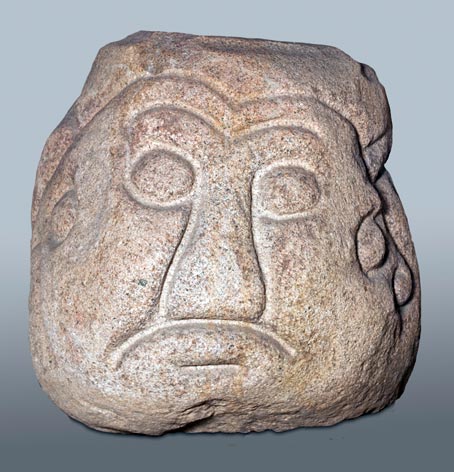Atheisten machen mobil. Anzeigenflächen auf Bussen werben für ein Leben ohne religiöse Gängelung. Die öffentliche Polemik richtet sich selbstbewusst gegen jede Form von religiös motivierter Unterdrückung des freien Willens des Menschen – allerdings indem sie das PRINZIP RELIGION generell in Frage stellt.
 Graffiti an der Fassade eines katholischen Gemeindehauses.
Graffiti an der Fassade eines katholischen Gemeindehauses.
Bild: Kô-Sen
Überall auf der Welt gerieren sich vor allem die Vertreter derjenigen Religionen, die einem anthropomorphen Gott huldigen, machtbesessen, intolerant und aggressiv missionarisch. Das Versprechen von Erlösung vermag immer weniger zu überzeugen. Übrig bleiben eingefahrene Gleise leerer Rituale – im harmlosen Fall. Im Worst Case mutieren Religionen zu etwas Bedrohlichem.
Gott ist nicht in Religionen, sondern IN UNS
Der gegenwärtig schwelende Konflikt zwischen deutschen katholischen Laien (ZdK) und der Bischofs-Hierarchie (Katholische Laien kritisieren Bischöfe  ) ist eines von zahllosen Symptomen, wie etablierte Religionssysteme immer stärker „verweltlichen,“ zu Instrumenten der Machtausübung verkommen. Der Islam muss sich gefallen lassen, dass kriminelle Stammesführer in seinem Namen Andersgläubige massakrieren. Bei vielen Juden und Hindus tickt im Hintergrund der Wahn, einem „ausgewählten Volk“ anzugehören. Was zu rassistischen Einstellungen gegenüber „Anderen“ führt.
) ist eines von zahllosen Symptomen, wie etablierte Religionssysteme immer stärker „verweltlichen,“ zu Instrumenten der Machtausübung verkommen. Der Islam muss sich gefallen lassen, dass kriminelle Stammesführer in seinem Namen Andersgläubige massakrieren. Bei vielen Juden und Hindus tickt im Hintergrund der Wahn, einem „ausgewählten Volk“ anzugehören. Was zu rassistischen Einstellungen gegenüber „Anderen“ führt.
Der lateinische Ursprung des Begriffes RELIGION, religio, wird traditionell als Gottesfurcht, modern gern auch im Sinne von re- also „zurück“ interpretiert. Doch überall, wo der Glauben an einen persönlichen Gott das Denken der Menschen prägt – also bei allen traditionellen Religionen außer Buddhismus und Taoismus – bekommt das ZURÜCK zunehmend den Sinn von ZURÜCKHALTEN.
Depeche Mode – Personal Jesus, live at Rock Am Ring 6-04-061
Bereits 1887 hat der irisch-amerikanische Mystiker und Theosoph, William Q. Judge, in einer Rezension eines Buches auf eine für den SUCHER AUF DEM PFAD wesentliche Erkenntnis hingewiesen: Religionen sind Menschenwerk. Sie vermögen in einem begrenzten Rahmen Moral und Ethik zu lehren. Doch weder geben sie schlüssige Antworten auf die drängen Fragen des Lebens, noch führen sie zu Selbsterkenntnis und spiritueller Befreiung. Denn Gott ist nicht in Religionen, sondern IN UNS.
Through the Gates of Gold2
By William Q. Judge
Ein Widerspruch provozierende Zitat zum Kommentar von Judge:
Religion holds a man back from the path, prevents his stepping forward, for various very plain reasons. First it makes the vital mistake of distinguishing between good and evil. Nature knows no such distiction.
Kommentar von W. Q. Judge:
Religion is always man-made. It cannot therefore be the whole truth. It is a good thing fort he ordinary and outside man, but surely it will never bring him to the Gates of Gold. If religion be of God how is it that we find that same God in his own works and acts violating the precepts of religion? He kills each man once in life; every day the fiercy elements and strange circumstances which he is said to be the author of, bring on famine, cold and innumerable untimely deaths; where then, in THE TRUE, can there be any room for such distictions as right and wrong?
The disciple, must as he walks on the path, abide by law and order, but if he pins his faith on any religion whatever he will stop at once, and it makes no matter whether he sets up Mahâtmas, Gods, Krishna, Vedas or mysterious acts of grace, each of these will stop him and throw him into a rut from which even heavenly death will not release him.
Religion can only teach morals and ethics. It cannot answer the question „what am I?“ The Buddhist ascetic holds a fan before his eyes to keep away the sight of objects condemned by his religion. But he thereby gains no knowledge, for that part of him which is affected by the improper sights has to be known by the man himself, and it is by experience alone that the knowledge can be possessed and assimilated.
(Quelle: The Path, Vol. I, March, 1887, pp. 372-77)
Ihnen droht das Wandeln auf eingefahrenen Gleisen
Demnach sind auch Buddhisten gefährdet, sowie alle esoterischen Gruppen, Schulen und Vereine, die sich nicht auf einen anthropomorphen Gott kaprizieren. Ihnen droht stattdessen das Wandeln auf eingefahrenen Gleisen, der Verlust von EIGENEN Einsichten und Erfahrungen. Das Streben nach Erkenntnis wird ersetzt durch astrales, emotionales und mentales Binden der eigenen separaten Existenzform – die, wie der Sucher eigentlich weiß, rein illusorisch ist – an das jeweils bevorzugte KONZEPT von Religion, mit all seinen Vorschriften, Ritualen und Gruppennormen. Rückschritt.
R.E.M. Losing My Religion3
(HEINZ KNOTEK)
- Kritische Reflexion zum typisch US-amerikanischen Phänomen verlogener christlicher Prediger. ↩
- Der Artikel ist ein Kommentar auf die inspirierte Einweihungsgeschichte Through the Gates of Gold von Mabel Collins. ↩
- Songtext zum Track:
Oh life, is bigger
It’s bigger than you
And you are not me
The lengths that I will go to
The distance in your eyes
Oh no I’ve said too much
I set it upThat’s me in the corner
That’s me in the spot-light
Losing my religion
Trying to keep up with you
And I don’t know if I can do it
Oh no I’ve said too much
I haven’t said enoughI thought that I heard you laughing
I thought that I heard you sing
I think I thought I saw you tryEvery whisper, of every waking hour
I’m choosing my confessions
Trying to keep an eye on you
Like a hurt, lost and blinded fool, fool
Oh no I’ve said too much
I set it upConsider this
Consider this, the hint of the century
Consider this the slip
That brought me to my knees, failed
What if all these fantasies come
Flailing aground
Now I’ve said too muchI thought that I heard you laughing
I thought that I heard you sing
I think I thought I saw you tryBut that was just a dream
That was just a dreamThat’s me in the corner
That’s me in the spot-light
Losing my religion
Trying to keep up with you
And I don’t know if I can do it
Oh no I’ve said too much
I haven’t said enoughI thought that I heard you laughing
I thought that I heard you sing
I think I thought I saw you tryBut that was just a dream
Try, cry, fly, try
That was just a dream
Just a dream
Just a dream, dream ↩
Zuletzt aktualisiert: 29.09.2012 von Heinz Knotek






